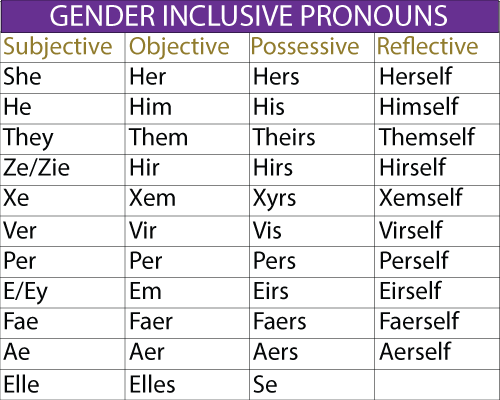What is gender inclusive language?
Gender Inclusive Language is written, oral and visual communication that does not exclude or demean any particular gender identity.
Gender Inclusive Language Handout
What is exclusionary language?
Exclusionary language is language that expresses bias in favors of one sex and thus discriminates against other gender identities. Language that discriminates against a gender identity by not adequately reflecting their role, status and presence in society is exclusionary.
What is the difference between inclusive vs neutral language?
The definition of neutral is a position of disengagement, not engaging or not aligned with or supporting any side or position. Whereas the definition of inclusive is to include a great deal, or encompassing everything concern, comprehensive. Many people use neutral and inclusive interchangeably, however, there is a difference in being neutral vs being inclusive. Inclusion focuses on affirming all identities rather than not taking a position. It is LGBTQ+ Initiatives philosophy to center inclusion and therefore utilize gender inclusive language. It is our recommendation to utilize gender inclusive language rather than gender neutral language.
Why use gender inclusive language?
Utilizing gender inclusive language demonstrates that you respect for individuals who identify on the gender expansive spectrum ad starts to address prejudice and discrimination.
What are pronouns?
Gender Inclusive Pronouns are pronouns that are not specifically gendered and can be utilized when referring to each other in the third person they are linguistic tools that we use to refer to people. We believe that it is important to give people the opportunity to state the pronoun that is correct to use when referring to them.
(This is NOT an exhaustive list. Any combination is possible!)

Example Sentences:
They (subject): They love coffee!
Zim (object): I asked zim to meet me in the library.
Xyrs (possessive adjective): I read xyrs book in my composition class.
Perself (reflexive): Per taught perselves to play the guitar.
For more information regarding pronouns, we encourage you to visit MyPronouns.org



